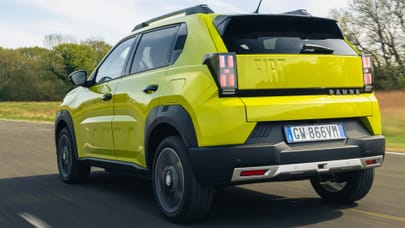
Mercedes-AMG's Project One will "match a Formula One car"
Yikes. TG gets more tech details on AMG's new 1,000bhp+ hypercar

It won't be nearly as fast as an F1 car... it'll match it

"Zero to 100km/h [0-62mph] is not a serious figure any more. So many EVs are quick, they have traction and no lag. But yes, the Project One will match a Formula One car." This is AMG's CEO Tobias Moers speaking to Top Gear.
We'd suggested that the Project One might not accelerate much more slowly than the Formula One car whose power unit it shares, because although it's heavier, it has AWD traction. We didn't expect him to say it was a match for the racer.
Gulp.
Advertisement - Page continues belowIt's quicker than a 918 to 125mph

The figure of six seconds for the 0-125mph run is officially published. A Porsche 918 Spyder, an astoundingly quick car and also with an electric front drive system, doesn't swing past that speed until a yawning 1.2 seconds later.
It'll boast more downforce than a full-blooded GT3 racer

The Project One should also be pretty handy at high-speed acceleration because of the active aero, helping to cut drag in the straights. The moving rear wing has another moving wing embedded in it. There are deployable vanes under the body, opening flaps in the front wheel-arches and more. When it's all in the high-grip position, says Moers, it makes more downforce than a GT3 racing car.
Computer simulation of the aero has been going on for many months, but also AMG is on its second full-size model that runs in moving flow wind tunnels to get a good idea of ground effects.
Advertisement - Page continues belowIn the Project One's electric mode, it's front-wheel-drive

Why does the Project One have front drive as well as the racer's rear-drive? "I wanted to increase battery capacity over the race car's, to have the possibility of pure electric drive. You can't do that with the MGU-K of the racing car."
That's because that MGU-K motor drives through the crankshaft, so it can only turn the wheels by turning the engine, which would mean crippling unnecessary friction if the engine weren't firing. The Project One can do about 15 miles electrically, at least if you drive it like an official EU-cycle tester.
It deploys lessons learned from the SLS e-drive

You might not be too excited with creeping along in electric drive. So try this: "Also I always wanted four-wheel-drive for torque vectoring. The SLS e-drive proved we could do that. So we use two more formula one MGU-K motors at the front." These spin to 50,000rpm each, and each drive via a gear train that's a part of the front chassis.
The 1.6-litre V6 is based on AMG's 2015 F1 engine

The hybrid power unit is most closely based on the 2015-spec item. But they had to make some changes for the road. It's limited to 11,000rpm – 11,000rpm! – but actually the racers seldom go about 12,500. So the driver really is getting close to an experience previously reserved for a very very few epically skilled men in Nomex.
The biggest issue with fitting an F1 engine wasn't vibration... but noise

The engine has been recalibrated to run on pump fuel, and to meet all worldwide emissions rules. It idles more slowly (1,000rpm vs 3,500rpm) so has a lower compression ratio. "The biggest issue is noise. Not vibration: you expect vibration at 10,000rpm. But structural-borne and airborne noise is really high, partly because the engine is bolted directly to the carbon-fibre tub with no cushioning mounts. They never gave a thought to that when they designed the race engine."
But Moers says he expected this would be an issue and that AMG is good at dealing with it.
Advertisement - Page continues belowReliability? Pah. Never a problem.

He was never bothered about reliability. "It's not hard. The racers drive at full power and full braking." The mortals who buy these cars won't. And making the engine reliable when driving slowly is actually the issue. "We have to make it idle in traffic, make it cold-start, make sure it doesn't coke the valves, make sure it has low-rpm lubrication."
It'll be Made in Britain

AMG has already announced that the power units will be built alongside the F1-spec units at the race team's facility at Brixworth in Northamptonshire. But there's one more surprise. Moers says it's likely the whole car will be assembled somewhere in Britain too, though he refuses so far to be more specific...
Advertisement - Page continues below
Trending this week
- Car Review
BMW iX3







